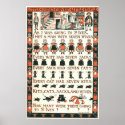Tips from Godey’s Lady’s Book, January 1855:
Method 1 – Mix equal quantities of fresh spirit of vitriol and lemon-juice in a bottle; shake well; wet the spots, and in a few minutes rub with a soft rag until they disappear. Another mode is to sponge the spots with a weak solution of muriatic acid or aquafortis.
Method 2 – If the marble be stained with oils, mix soft soap, fuller’s earth, and hot water into a paste; cover the spots with the paste, and let it dry on. The next day scour it off with soft or yellow soap.
Method 3 – Boil half, a pound of soft soap in a quart of water, very slowly, until the water is reduced to a pint. Apply this in the same manner as the preceding.
You'll see that I added some links to help you; but here are a few other notes.
Regarding "soft soap," as it was in the 1800s: Soft soap is traditionally discussed as that made simply by omitting the salt from your soap recipe process, keeping the soap in a jelly-like state. Soap with salt creates the "hard soap" most of us are familiar with. However, many soap makers will also tell you that the firmness of a soap will also depend upon the type of grease or fat used to make it. Hard soaps come from "hard fats." Hard fats are those which melt at a higher temperature: beef, goat, sheep and lamb. "Soft fats", those which melt at lower temperatures, such as chicken or pork, will soften your soap -- even if only used in combination with other, harder, fats. "Yellow soap" is a hard soap made from tallow (fat from cattle and sheep) and resin (salts).
Why two kinds of soap? Different uses -- which are largely based on thrift. Since you can control (and so spare) the amount of soft soap taken from the barrel or jar stored in, soft soap is ideal for spot cleaning like stain removal. Soft soaps were also often used for washing dishes and floors because you could rather easily guesstimate the amount of soap needed and only put that much in the bucket -- and, because soft soaps dissolve easier than hard soaps, you don't wait long for the soap to be ready to use. Hard or bar soaps are best used for bathing, where the hard soap takes longer to break down and so lasts through however long it is put to use in the bath or shower. Hard soaps were also used for laundry for similar reasons; one bar to last for a longer amount of time, still leaving you with soap when the chore is finished.
There's no reason why you couldn't try soap jelly or other thrifty soap tips. However, if you want a more historically authentic experience, check out Grandpappy's Homemade Soap Recipes. Also, if you've been thinking of using your leftover bacon grease to make soap, you might want to read this first.




















0 comments:
Post a Comment